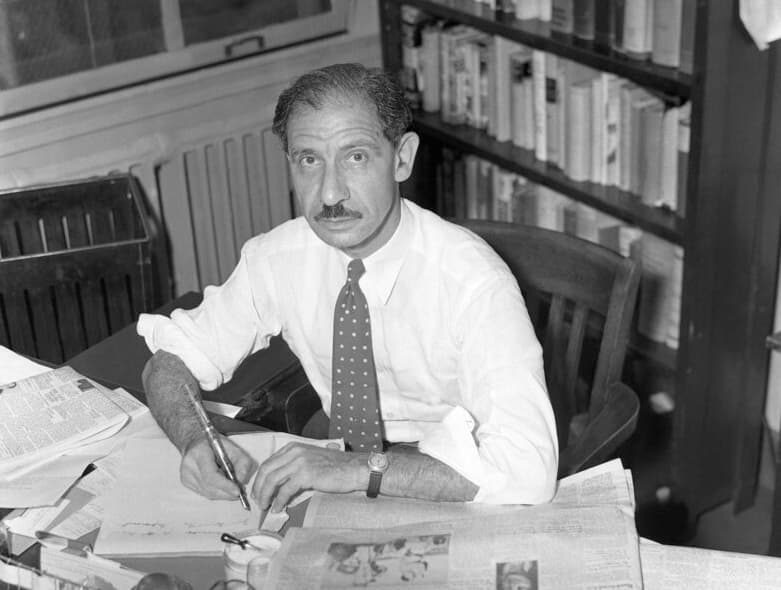Poem of the Day: ‘A Ballad of Baseball Burdens’
Franklin P. Adams was a Manhattan newspaper columnist back when that was very much a gig that mattered. He also published his own clever and comic poetry in his books and the papers for which he worked.

Franklin P. Adams (1881–1960) was a Manhattan newspaper columnist back when that was very much a gig that mattered. Between 1904 and 1941, he rolled from a column at the New York Evening Mail, to a column at the New-York Tribune — then the New York World, the New York Herald Tribune, and the New York Post (along with a stint at Stars and Stripes, under Harold Ross, during World War I). Never, alas, for The New York Sun.
He filled his writing with witty and clever accounts of the social world of New York and the state of American literature. See, for example, “High-Born Kinsman Abducts Girl from Poet-Lover — Flu Said to Be Cause of Death — Grand Jury to Probe,” his police-blotter parody of Edgar Allan Poe’s “Annabel Lee” (which ran as the Sun’s Poem of the Day last fall). To be a contemporary poet and be mentioned in Adams’s column was to be anointed as an important figure.
He also published his own clever and comic poetry in his books and the papers for which he worked, including his most famous verse, “Tinker to Evers to Chance,” a New York Giants’ fan’s 1910 baseball wail about the Chicago Cubs’ infield. This past spring, the Sun featured “Monotonous Variety,’ his complaint about fiction writers’ word choice.
Yesterday, the Sun offered Dorothy Parker’s “Ballade of a Great Weariness,” with some discussion of English poets’ use of that medieval French form. In today’s Poem of the Day, Franklin P. Adams’s “A Ballad of Baseball Burdens,” we have another ballade, this one extended with an extra stanza but generally following the rules of a repeated refrain for the verses and a concluding quatrain.
Besides, it’s poetry about baseball, and baseball always enraptured Adams. The Sun has been featuring baseball verses this summer — in B.H. Fairchild’s elegy for Junior Gilliam, for example, and Thayer’s “Casey at the Bat,” and the anonymous “Slug the Umpire,” and Grantland Rice’s grief at the death of Babe Ruth, “Game Called.”
Adams’s “A Ballad of Baseball Burdens” appeared in his 1912 book, “In Other Words.” The refrain, “This is the end of every fan’s desire,” comes at the end of each stanza’s listing of a “burden” that baseball forces on its players and fans: the burden of hard hitting, the burden of good pitching, the burden of loud cheering, the burden of a pennant. But in the end, Adams concludes, it is the race of the season, not its pennant-winning end, that matters.
A Ballad of Baseball Burdens
by Franklin Pierce Adams
The burden of hard hitting. Slug away
Like Honus Wagner or like Tyrus Cobb.
Else fandom shouteth: “Who said you could play?
Back to the jasper league, you minor slob!”
Swat, hit, connect, line out, get on the job.
Else you shall feel the brunt of fandom’s ire
Biff, bang it, clout it, hit it on the knob —
This is the end of every fan’s desire.
The burden of good pitching. Curved or straight.
Or in or out, or haply up or down,
To puzzle him that standeth by the plate,
To lessen, so to speak, his bat-renown:
Like Christy Mathewson or Miner Brown,
So pitch that every man can but admire
And offer you the freedom of the town —
This is the end of every fan’s desire.
The burden of loud cheering. O the sounds!
The tumult and the shouting from the throats
Of forty thousand at the Polo Grounds
Sitting, ay, standing sans their hats and coats.
A mighty cheer that possibly denotes
That Cub or Pirate fat is in the fire;
Or, as H. James would say, We’ve got their goats —
This is the end of every fan’s desire.
The burden of a pennant. O the hope,
The tenuous hope, the hope that’s half a fear,
The lengthy season and the boundless dope,
And the bromidic; “Wait until next year.”
O dread disgrace of trailing in the rear,
O Piece of Bunting, flying high and higher
That next October it shall flutter here:
This is the end of every fan’s desire.
ENVOY
Ah, Fans, let not the Quarry but the Chase
Be that to which most fondly we aspire!
For us not Stake, but Game; not Goal, but Race —
THIS is the end of every fan’s desire.
